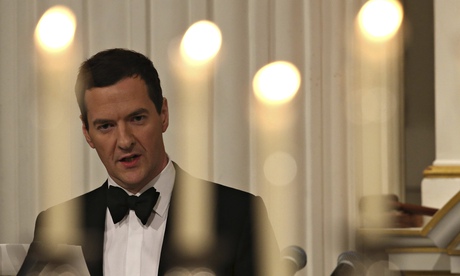
When the chancellor of the exchequer made his annual speech at the lord mayor's Mansion House dinner on Thursday evening, George Osborne was more than a little upstaged. The Bank of England governor, Mark Carney, had just given a dense and well-delivered speech, which included a surprise announcement about interest rates. Osborne's address was the economics equivalent of Joe Pasquale taking the stage after Bill Hicks.
There was, admittedly, more meat in the chancellor's speech than many had expected from what has become known as a "zombie government". True to that description, however, it seemed to involve much aimless shambling in various, often contradictory directions in search of brains.
There was the usual reeling off of meaningless boasts: the old chestnut of "a record number of people in work". Because of population increases, with the exception of periods of deep contraction, there is almost always a record number of people in work. There is a record number of people in everything, because there is a record number of people.
Another oft-repeated claim is that Britain is "growing faster than any advanced economy"; again true, but consider how slowly the UK economy had been growing in comparison to its rivals.
When the US economy, for example, with its focus on stimulus rather than austerity, was growing at 2.8% in 2012, the UK was stuck at a measly 0.3%. Sneaking ahead of the US by 0.1% in 2014 is hardly anything to write home about, especially since the IMF predicts the US rate will leave the UK far behind again next year. Such selective claims are hardly worthy of a pre-election TV debate, let alone an audience of industry professionals.
"And a budget deficit this year set to be half what it was," added the triumphant chancellor.
Lord Lawson crowed on Friday's Radio 4 Today programme that this proved Osborne had been "totally vindicated" in his approach. Unless the river Lethe has washed over the City recently, causing mass amnesia, all will remember that Osborne's promise a mere four years ago was to eliminate the deficit entirely in his first term; halving the deficit was the projection under his Labour predecessor's plan, a plan that did not involve anything near the depth of cuts visited on this country's public services that they have actually suffered.
After four years of merciless austerity and economic misery, are we meant to applaud the fact that Osborne has so spectacularly missed his single most important target?
There were also announcements about new domestic criminal offences for market abuse that involve foreign exchange, derivatives and bonds. These I heartily applaud. It is spurious, however, to suggest that the chancellor is proposing the offences in order to stay ahead of the curve; or, as he put it: "Let us not wait for the next wave of scandals in financial markets to hit us before we respond."
We are already neck-deep in the next wave of scandals. More than 30 foreign exchange traders were removed from forex trading after the German financial watchdog discovered clear evidence of attempted currency-rate manipulation. Both the Swiss and our own financial regulators in the UK have announced that they are stepping up levels of scrutiny.
The housing price bubble got its share of measures as well, and this is where policy appears most confused. Osborne made a much-trailed announcement that he would give the Bank of England the ability to limit mortgages, either by income multiplier or by house value, in order to cool the market, if needed.
Such controls have been tried recently in both New Zealand and – by Carney himself – in Canada, and have turned out to be inadequate. In the end, both central banks had to raise lending costs. Nothing was said of the government's help-to-buy scheme, which is undeniably adding heat to the market.
This paper's editorial has rightly described Osborne's policy on housing as tantamount to "pressing down on both the accelerator and the brake at the same time". Added to this is Carney's warning – rather Delphic in its ambiguity – that interest rates could rise "sooner than markets currently expect".
There is a dangerous scenario, in which the combination of these rather vague pronouncements could cause the housing market to further overheat as thousands of people rush to buy property in order to get under the wire of more stringent mortgage assessments, and beat the spectre of higher interest rates with a fixed-rate mortgage. In an election year, the more cynical observer might point out that this may, indeed, be the desired result. More growth underpinned by nothing but froth.
More pre-election boasting. And what of the resulting bubble? Well, if Osborne is still in power after 2015, he will have five years to try to come up with a plausible narrative of why it was all someone else's fault. If he is not in power, it will be someone else's problem.

